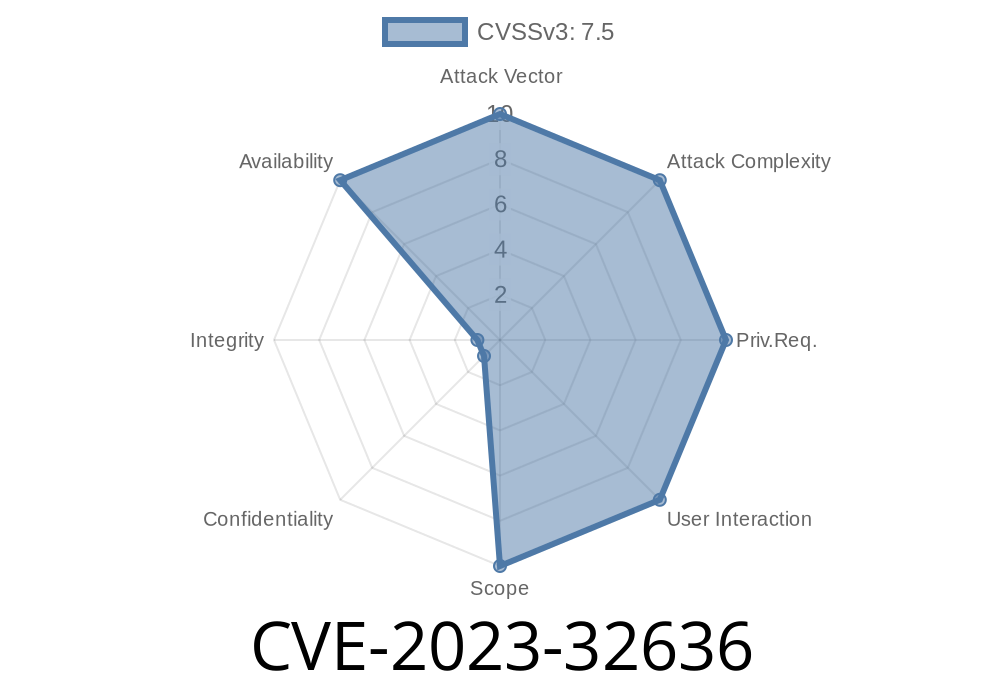In the world of cybersecurity, sometimes the patch to fix one bug accidentally opens the door to another. This is exactly what happened with CVE-2023-32636, a denial-of-service (DoS) vulnerability found in glib’s GVariant deserialization code—a problem introduced when maintainers addressed the earlier security concern CVE-2023-29499. If you're running backported fixes for this earlier CVE (as recommended by glib developers), you might unknowingly be exposed to this new risk.
Let's dive into how this happened, look at some code, see what this means for real-world systems, and explore proof-of-concept (PoC) code.
Background: What is glib & GVariant?
- glib is a core library used by many Linux applications for things like data structures and types.
- GVariant is a serialization format in glib, often used for IPC (inter-process communication). In short, it decides how complex data is turned into strings of bytes and back.
The Story: Patch, Patch, BOOM!
1. A vulnerability (CVE-2023-29499) was found in GVariant’s deserialization. Attackers could craft bad data, leading to undefined behavior.
2. glib devs issued a fix. That fix added extra input validation—basically, the code *now* checks more thoroughly whether what's coming in is valid.
3. Some Linux distros (Fedora, RHEL, etc.) backported this fix to older glib versions, following developer advice.
Here’s the kicker: that new validation code does *not* exist in any formal glib release.
5. The validation looked good…but it was super slow if an attacker sent crafted data, leading to a denial of service (the process/cpu stalls for a long time).
So, if you run a glib version with the backported fix but not a new, official release—*you might be vulnerable.*
Technical Deep Dive
The heart of the problem is the offset table validation that happens during deserialization.
Suppose data is a serialized GVariant blob from an untrusted source. The validation code inspects the *offset table* (used for splitting one part of the input from another). If the table was huge or malformed, the validation could take a ton of time and CPU.
Let's see what this “slow” validation might look like (simplified for illustration)
// Not the actual code! A simplified illustration
for (size_t i = ; i < num_offsets; i++) {
if (offsets[i] < min_value || offsets[i] > max_value) {
fail("Bad offset value");
}
// Comparing each offset against the rest
for (size_t j = ; j < num_offsets; j++) {
if (i != j && offsets[i] == offsets[j]) {
fail("Duplicate offset found");
}
}
}
// ...processing continues
In the worst case, an attacker creates a data blob with a huge number of offsets (say, thousands or millions). Every offsets[i] gets compared with every offsets[j], so the runtime becomes quadratic (O(n^2)). This bogs down CPU and potentially hangs the target app.
Exploit Concept
An attacker could send a malicious GVariant blob (for example, via D-Bus or any IPC using GVariant) with an intentionally huge/difficult offset table.
Send this data to a service using the vulnerable glib code.
3. The target software will *choke* on deserialization—using up CPU and possibly freezing/crashing.
Python PoC (Conceptual)
# WARNING: Do not use on production systems. This is just a concept.
fake_offsets = b""
num_offsets = 100000 # Large value to cause slow validation
for _ in range(num_offsets):
# All zeros for duplicate offset test
fake_offsets += b"\x00\x00\x00\x00"
# You would need to format the full GVariant blob correctly...
with open("poc-gvariant.bin", "wb") as f:
f.write(b"GVaR" + fake_offsets) # Not a real GVariant, just for illustration
Then, run a vulnerable program that tries loading or deserializing this blob—it will get stuck.
> Important: Actual exploit code would involve precise GVariant formatting. This is only a simplified conceptual demonstration.
No official glib releases are known to be affected.
- Only distros/backports applying the CVE-2023-29499 fix as described by glib upstream developers are vulnerable to *this* issue.
- If you did not backport that specific fix (and instead upgraded to a glib version that never had that code), then you are safe.
References
- Red Hat Security Advisory: CVE-2023-32636
- Debian Security Tracker: CVE-2023-32636
- glib issue tracker: Discussion
- Glib GVariant Documentation
Conclusion
CVE-2023-32636 illustrates an unfortunate side-effect: fixing one security issue can introduce another, if the fix isn’t carefully checked for performance/corner cases. If your systems rely on GVariant and you’ve applied early/partial fixes, make sure you’re not stuck with this “boomerang” DoS bug.
Stay patched, stay safe—and always test those security fixes under real-world scenarios!
*This article is original content, meant to explain technical vulnerabilities in a clear, practical way for sysadmins, developers, and security enthusiasts. Share but don’t copy wholesale, please!*
Timeline
Published on: 09/14/2023 20:15:09 UTC
Last modified on: 11/10/2023 18:15:07 UTC
